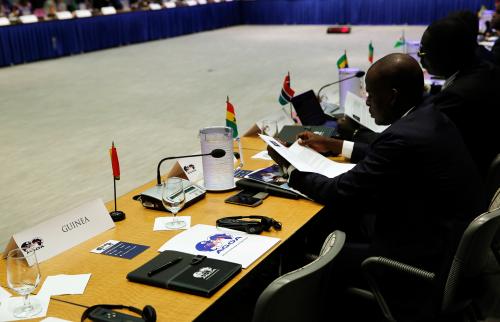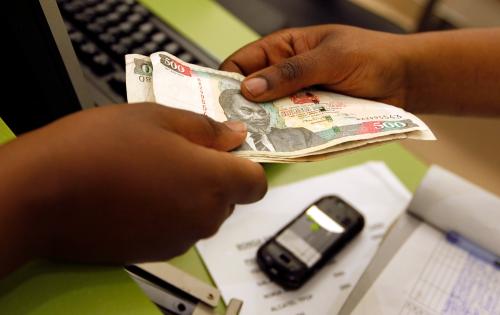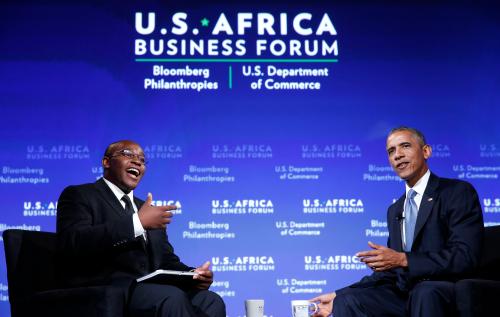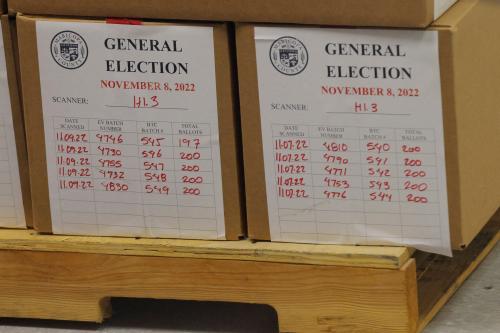The second U.S.-Africa Business Forum, while subdued, reiterates American-African economic engagement
On Wednesday, September 21, the U.S. Commerce Department and Bloomberg Philanthropies hosted the second U.S.-Africa Business Forum in New York. According to the White House, this forum built “upon the partnerships created in 2014 with new commitments to mobilize an additional $9.1 billion in trade and investment to support the development of Africa’s consumer goods, construction, energy, healthcare, manufacturing, telecommunications, and transportation sectors.” Indeed, American investment has been growing on the continent for some time. During his speech, President Obama noted that American investment in Africa has grown by 70 percent since 2014, praising major companies such as FedEx, Kellogg, Microsoft, MasterCard, and Google, among others, for their growth there. He also stated that $15 billion in deals have been concluded between African and American businesses. Also at the forum, Caterpillar and its foundation announced over $1 billion in projects over five years, including in construction machinery, traditional and renewable power generation solutions, diesel-electric locomotives, marine engines, and mining equipment.
As part of rising U.S.-African economic engagement, President Obama also announced and expanded his new Presidential Advisory Council on Doing Business in Africa from 15 to 24 members. The Commerce Department and the Nigerian Ministry of Industry, Trade and Investment established the U.S.-Nigeria Commercial and Investment Dialogue to “sustain engagement between our governments and private sectors in order to promote deeper trade and investment ties between the United States and Nigeria.” This move was welcomed by Nigerian President Muhammadu Buhari who had high expectations for the forum, stating that Nigeria will soon be “one of the most attractive places to invest.”
In addition, the day before the forum, Commerce Secretary Penny Pritzker sat down with CEOs and East African heads of state to discuss economic opportunities related to travel and tourism, agribusiness technology, and infrastructure sector in the region, agreeing to “launch a Travel and Tourism Dialogue, scale a digital platform on agriculture across East Africa, and work toward convening an Infrastructure Summit.”
Nigeria’s economic issues lead to S&P downgrade
Nigeria’s economy suffered another blow this week as ratings agency Standard and Poor’s downgraded its sovereign credit rating from B+ to B with a negative outlook. S&P based its decision to revise Nigeria’s rating downward on several factors, including the “contraction in oil production, a restrictive foreign exchange policy, and delayed fiscal stimulus.” Furthermore, the country is headed for a recession, according to the IMF, after its gross domestic product contracted in the last two quarters and is projected to shrink through the end of the year. Despite the current low levels of government debt, servicing costs as a percentage of GDP are continuing to mount signaling that investors are wary of the risks to growth in Nigeria. Meanwhile, Nigeria is hoping to raise $1 billion in eurobonds to help plug the budget deficit, although the downgrade may diminish investors’ appetites for the euro-denominated bonds.
There is hope on the horizon, however, as the government’s record budget comes into effect with big plans to stimulate the economy. In a recent Bloomberg opinion piece, President Buhari argues that leveraging debt to invest in infrastructure while tackling corruption and supporting public-private partnerships will enable the country to improve conditions for doing business and help the economy diversify. Indeed, during a bilateral meeting with President Obama on the sidelines of the 71st U.N. General Assembly meetings in New York, President Obama expressed confidence in Buhari’s administration, stating, “We have confidence in your leadership. There are some difficulties you face, but this administration is willing to assist in the short time we have left.”
Pre-electoral violence erupts in the Democratic Republic of the Congo
This week, violence erupted in the Kinshasa, the Congolese capital, over President Joseph Kabila’s bid to extend his mandate. Last weekend, the electoral commission officially requested a vote delay—in order to properly formalize its voter list—from the constitutional court. The court has yet to make a ruling. This request was met with the eruption of violence on Monday. The unrest has left a significant number of people dead, both on the civilian and police side. While the Congolese police estimates the total death toll at 32, the opposition states that this figure surpasses the 100 mark, as police forces were firing live ammunition at protesters.
President Kabila has been in office since January 2001. He came into power at age 29, after the assassination of his father, President Laurent Kabila. His rise to power was preceded by a constitutional reform allowing presidential candidates under the age of 35. As required by the Congolese constitution, reformed and adopted in 2006, President Joseph Kabila is set to step down by the end of December 2016, when his current mandate expires, following elections originally scheduled for November. However, President Kabila has yet to voice his intention to step down at the end of his present term. According to Bloomberg, as of last week, the DRC’s justice minister had already issued a statement saying that the president will remain in power until the completion of the voter registration process and an election can be held, but did not give a timeline. The international community—U.N. Secretary-General Ban Ki-moon, the United States, France, Belgium, and the African Union—has condemned the violence and is urging the government to set an election date.







Commentary
Africa in the news: US-Africa Business Forum deals, Nigeria’s credit rating downgrade, and DRC’s deadly protests
September 23, 2016